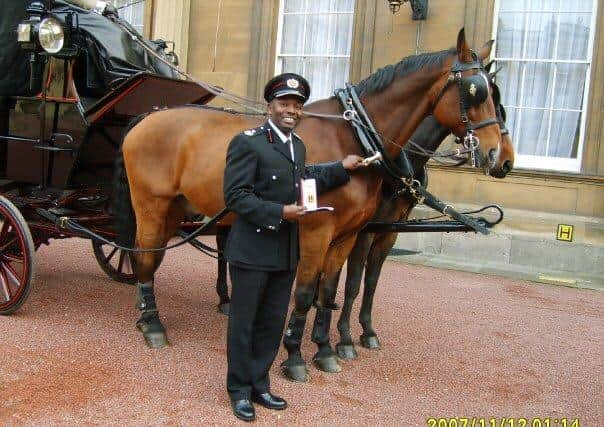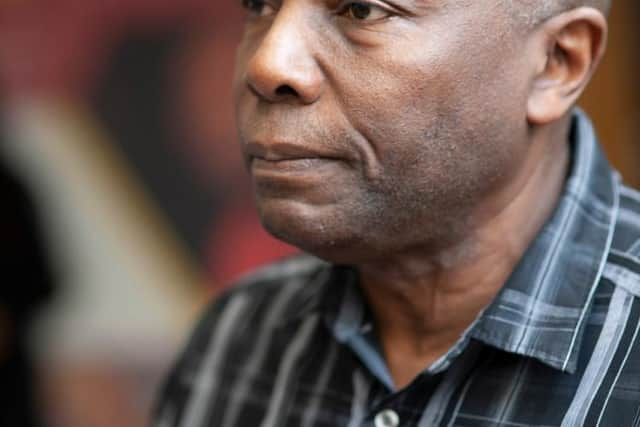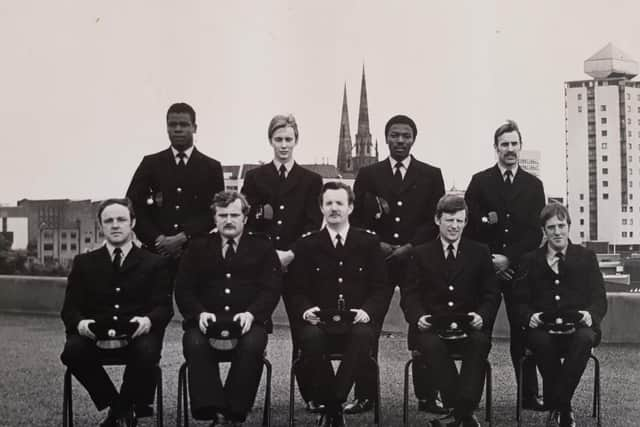Retired Scottish fire chief Wayne McCollin recalls racial intolerance he endured in childhood after moving from Barbados in 1960
and live on Freeview channel 276
Let us know what you think and join the conversation at the bottom of this article.
Wayne McCollin, who rose to the rank of assistant chief officer in the former Lothian and Borders Fire Service, first experienced racial intolerance when he moved to the UK with his family in 1960.
Now retired, he has recalled the racial slurs directed at him in his younger days.
Advertisement
Hide AdAdvertisement
Hide Ad“That was a culture shock. People wanting to play with your hair and calling you nig-nog or coon,” he said.
“It was how things were in the 60s – there was nothing you could do. It was completely wrong, but it was what it was".
McCollin did not let the racism hinder him – when he was a child he dreamed of being a doctor or a dentist, and after he left school, he went off to do a dental technician’s course with the RAF.
But his plans all changed when his older brother Louis became a firefighter – with McCollin deciding to follow in his footsteps.
Advertisement
Hide AdAdvertisement
Hide Ad

“We were very young when we arrived in the UK, and when Louis saw a fire engine it captured him,” he said.
"He always wanted to be a firefighter. He tried four different services before getting accepted by Walsall Fire Brigade, a small service in the West Midlands.
“When the West Midlands came together, he become one of 2,500 firefighters - and one of three black and minority ethnic (BME) firefighters. I started my career being told if you are half the firefighter of your brother – you will be alright.”


In his career as a firefighter, and then as a senior officer, McCollin pushed for greater diversity within fire and rescue services.
Advertisement
Hide AdAdvertisement
Hide AdHe said: “I was the chair of the joint recruitment board for the three services – Lothian and Borders, Fife and Central. We introduced some initiatives to try and improve the diversity of the services, and although we managed to get the numbers up of BME, they weren’t as high as we would have liked.
“Culturally, services are still evolving but it is going to take time. Trying to break it down has been the biggest challenge.
“There are feelings of ‘we’re really good at what we do – why change?’ and individuals who saw nothing prejudicial in their actions or thoughts and couldn’t understand why these issues were being raised.”


Since McCollin retired from Lothian and Borders Fire and Rescue Service, he has become involved with training and is currently vice treasurer of the Asian Fire Service Association.
Advertisement
Hide AdAdvertisement
Hide AdHe has also been active within the Fire Brigades Union, and was the first chair for black and ethnic minority members.
“We all have a desire to make life for the next generation less traumatic than what we have gone through,” he said.
"Being the role model has always been part of everything I did. It’s not saying if I can do it, you can do it – it’s just to show that it’s possible for people from all backgrounds to do this job.”
While McCollin has faced racism in UK, he still gives credit to his parents for making the move from Barbados decades ago.
Advertisement
Hide AdAdvertisement
Hide AdHe said: “They took a decision they believed was right for their family and leapt into the unknown. They worked hard - it must have been really tough for them, and I am really appreciative of what they did.
“I’m proud to be a Bajan, or Barbadian, and I hope for a better future for my three daughters and six grandchildren.”
READ MORE: Black History Month 2021: All the Black History Month events taking place in Edinburgh this October
Assistant chief officer Stuart Stevens, who is the Scottish Fire and Rescue Service’s ethnic minority champion, said: “Black History Month is an opportunity to not only celebrate but to celebrate the contribution and legacy of Scotland’s BME communities.
"Stories such as Wayne’s allow us to take stock through lived experience, both positive and negative, and learn from that to support our drive to be more inclusive as a service and as a society.
Advertisement
Hide AdAdvertisement
Hide Ad“Serving Scotland’s diverse communities is an honour, and I am fully committed to advocating for excellent public services that meet the unique needs of different community groups”.
A message from the Editor:Thank you for reading this article. We're more reliant on your support than ever as the shift in consumer habits brought about by Coronavirus impacts our advertisers.
If you haven't already, please consider supporting our trusted, fact-checked journalism by taking out a digital subscription.
Comment Guidelines
National World encourages reader discussion on our stories. User feedback, insights and back-and-forth exchanges add a rich layer of context to reporting. Please review our Community Guidelines before commenting.
